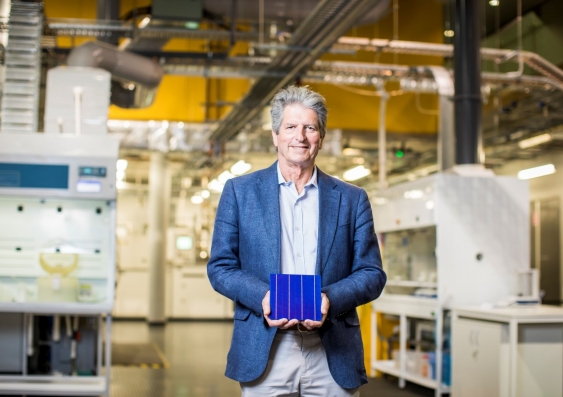
Prestigious engineering prize awarded for research and development in PERC solar technology. Image: University of Sydney/ Anna Kucera.
The 2023 Queen Elizabeth Prize for Engineering (QEPrize) has been awarded for the research and development of passivated emitter and rear cell (PERC) solar photovoltaic technology.
The prize was awarded to Professor Martin Green, Professor Andrew Blakers, Dr Aihua Wang and Dr Jianhua Zhao for their research into the technology.
Collectively, the group improved the energy conversion efficiency of silicon cells by improving the quality of both the top and the rear surface of standard silicon solar cells. The PERC technology additionally adds a layer on the back surface to prevent recombination and reflects unused photons back into the silicon to generate more electrons.
This reduces the cost of solar panels with QEPrize having stated that the cost of solar power generation reduced by over 80% in the last decade. PERC technology is now the most commercially viable and efficient silicon solar cell technology used in solar panels and large-scale electricity production, it noted.
In 1983, Green and Blakers at the University of New South Wales produced solar cells with 18% efficiency, surpassing the 16.5% recorded previously. They then published cell results of 19% and 20% efficiency, and theoretically determined the maximum achievable efficiency to be close to 30%.
In 2023, Wang and Zhao built on this previous research conducted by Green and Blakers to achieve a “global record” for solar cell efficiency reaching 25%. This surpasses the previous record of 20%.
The awardees published their findings with no patent with hopes to spark further innovation with PERC technology and drive down the cost of solar energy generation further.
“I am honoured to share this esteemed award with Andrew Blakers, Aihua Wang and Jianhua Zhao. As engineers, we are constantly striving to improve the world we live in,” said Professor Martin Green.
“As the world feels the devastating impacts of our changing environment and collapsing ecosystems, I feel passionately that more must be done to reduce our reliance on fossil fuels and keep up with the trajectory of human civilization. I hope that PERC technology winning the QEPrize will open many people’s eyes to the possibilities of renewable energy.”
Creating more efficient solar panels could be a crucial development in not only the UK’s target for achieving net zero by 2050, but could also be instrumental in supporting global efforts.
Not only can it be introduced to bolster national grids, solar can also be utilised as a means to create micro-grids in countries where a nation wide grid is unattainable.
“I am greatly honoured and pleased to receive this award. We have been deeply committed to the research and development of PERC technology for many decades, and so to be recognised alongside Martin Green and Andrew Blakers for this contribution is very special,” said Dr Jianhua Zhao.
